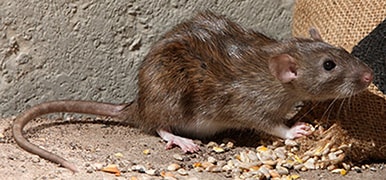Rodent Control
Jurisdictions have closed or limited service at restaurants and other commercial establishments to help limit the spread of COVID-19. Rodents rely on the food and waste generated by these establishments. Community-wide closures have led to a decrease in food available to rodents, especially in dense commercial areas. Some jurisdictions have reported an increase in rodent activity as rodents search for new sources of food. Environmental health and rodent control programs may see an increase in service requests related to rodents and reports of unusual or aggressive rodent behavior.
Eliminate Conditions That Attract Rodents

Follow established guidelines when cleaning up after rodent infestations to prevent exposure to rodent-borne diseases.
During rodent-related service calls and inspections, environmental health practitioners should advise residents and business owners to eliminate conditions that may attract and support rodent presence. Preventive actions include sealing up access into homes and businesses, removing debris and heavy vegetation, keeping garbage in tightly covered bins, and removing pet and bird food from their yards.
Monitor Rodent Populations
After natural disasters like hurricanes, communities often experience a decline in rodent populations, followed by an increase in rodent populations as commercial activity returns to normal. Environmental health programs should continue rodent monitoring and control activities after these events.
Rodent bait stations may become a more attractive food source for rodents, so stations may need to be serviced more often. It is important to monitor rodent activity during this time and develop indicators to help inform rodent control strategies. Integrated Pest Management: Conducting Urban Rodent Surveys and Rodent Control After a Disaster provide useful information on monitoring rodents.
Clean Up after Rodents
Follow established guidelines when cleaning up after rodent infestations to prevent exposure to rodent-borne diseases. Fleas are common on rodents. In areas of heavy rodent infestations, workers should consider using a repellant registered by the U.S. Environmental Protection Agency (EPA) as effective against fleas to prevent flea bites and minimize exposure to fleaborne disease.
Learn more about clean-up methods and personal protective equipment for protecting health and safety during clean-up operations.
Additional information on controlling rodents from EPA: https://www.epa.gov/rodenticides


































No hay comentarios:
Publicar un comentario